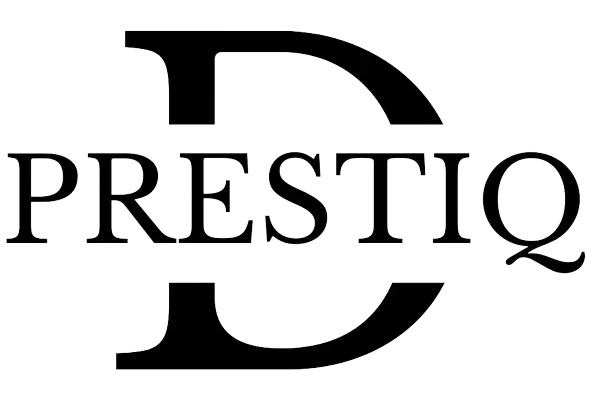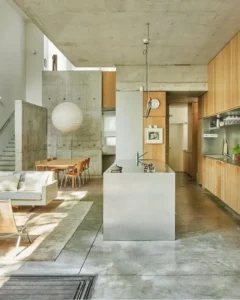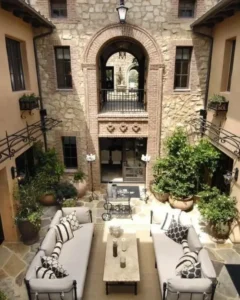Are concrete block homes energy efficient? This is a question that has been on the minds of many homeowners and potential home buyers. With the increasing focus on energy efficiency and sustainability, it’s important to understand how different building materials can impact the energy efficiency of a home. In this article, I will explore the topic of concrete block homes and their energy efficiency.
Concrete block homes have been around for decades and are known for their durability and strength. But when it comes to energy efficiency, are they a good choice? The answer is yes, concrete block homes can be very energy efficient if they are built and insulated properly. The high thermal mass of tightly sealed concrete walls, along with insulation, prevents drafting and creates an airtight high-performing, energy-efficient home. Concrete mass slows the movement of heat through a wall compared to wood. Additionally, concrete homes are ideal for anyone who wants to lower their energy usage. It provides an excellent level of value in an environmentally friendly home.
Are Concrete Block Homes Energy Efficient?
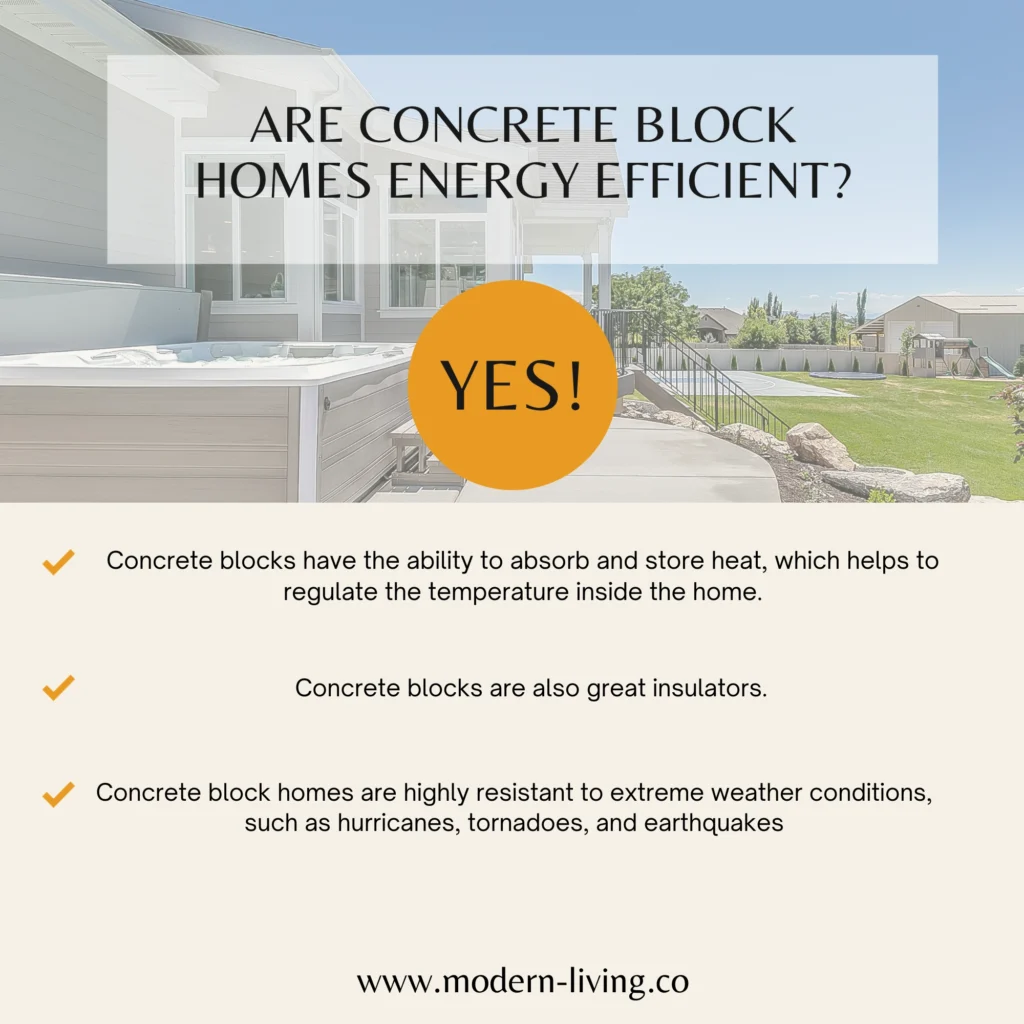
Thermal Mass Properties
One of the main reasons why concrete block homes are energy efficient is because of their thermal mass properties. Concrete blocks have the ability to absorb and store heat, which helps to regulate the temperature inside the home. During the day, the blocks absorb heat from the sun and release it at night, keeping the home warmer in the winter and cooler in the summer.
Insulation Factors
Concrete blocks are also great insulators. They have low thermal conductivity, which means that they do not allow heat to pass through easily. This makes them ideal for keeping the home warm in the winter and cool in the summer. In addition, concrete blocks can be filled with insulation material, such as foam, to increase their insulation properties.
Weather Resistance
Concrete block homes are also highly resistant to extreme weather conditions, such as hurricanes, tornadoes, and earthquakes. The strength and durability of the blocks make them ideal for withstanding high winds and heavy rain. In addition, concrete blocks do not rot, warp, or decay, making them a great choice for areas with high humidity.
Comparing Concrete Block Homes with Other Building Materials
In this section, I’ll compare concrete block homes with three other popular building materials: wood, steel, and brick.
Wood
Wood is a popular choice for home construction because it’s relatively inexpensive and easy to work with. However, wood is not as durable as other building materials and is susceptible to rot, insects, and fire.
In terms of energy efficiency, wood is a good insulator, but it doesn’t have the same thermal mass as concrete blocks. This means that wood homes can experience more significant temperature fluctuations, which can lead to higher energy bills.
Steel
Steel homes are becoming more popular because they’re durable, fire-resistant, and resistant to pests. However, steel is more expensive than other building materials, and it’s not as easy to work with.
When it comes to energy efficiency, steel is a good conductor of heat, which means that it can transfer heat energy through the walls more easily than materials like wood or insulation. This can lead to higher energy bills.
Brick
Brick homes are known for their durability, fire resistance, and energy efficiency. Brick has excellent thermal mass, which means that it can absorb and store heat energy from the sun during the day and release it slowly at night. This can help regulate indoor temperatures and reduce energy bills.
However, brick is more expensive than other building materials, and it’s not as easy to work with. Additionally, brick homes require more maintenance than other types of homes.
Improving Energy Efficiency in Concrete Block Homes
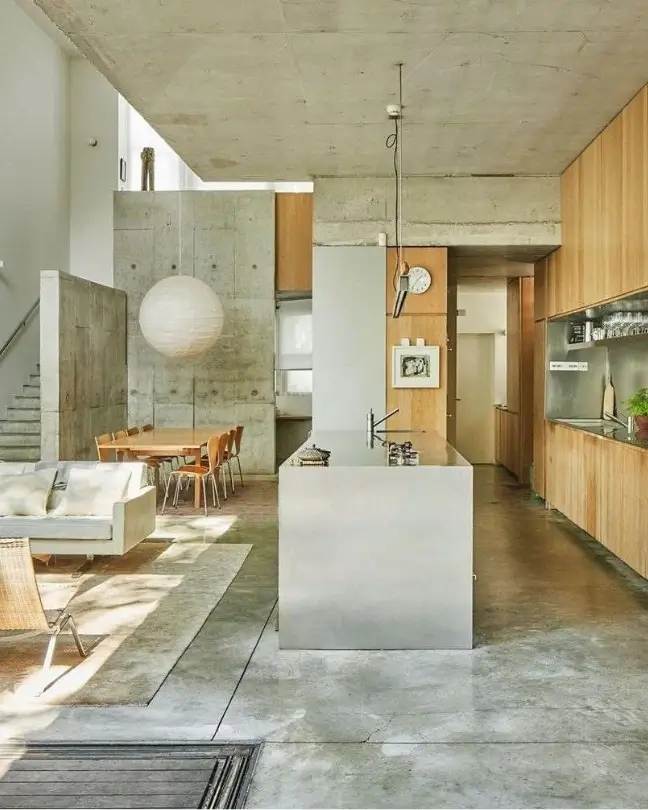
Proper Sealing
One of the easiest ways to improve energy efficiency in your concrete block home is to make sure that it’s properly sealed. This means checking for any gaps or cracks in your walls, windows, and doors and sealing them up. This will prevent air leaks, which can be a major source of energy loss. You can use caulking or weatherstripping to seal up any gaps or cracks.
Insulation Upgrades
Another way to improve energy efficiency in your concrete block home is to upgrade your insulation. While concrete block homes are naturally more energy efficient than other types of homes, adding additional insulation can make a big difference. You can add insulation to your walls, attic, and basement to help keep your home warm in the winter and cool in the summer.
Use of Energy Efficient Windows
Finally, consider upgrading your windows to energy efficient windows. While concrete block homes are naturally more energy efficient than other types of homes, windows can be a major source of energy loss. Energy efficient windows are designed to prevent heat transfer, which can help keep your home more comfortable and reduce your energy bills.
By properly sealing your home, upgrading your insulation, and using energy efficient windows, you can make your concrete block home even more energy efficient. Not only will this help you save money on your energy bills, but it will also help reduce your carbon footprint and make your home more comfortable.
Real-World Examples of Energy Efficient Concrete Block Homes
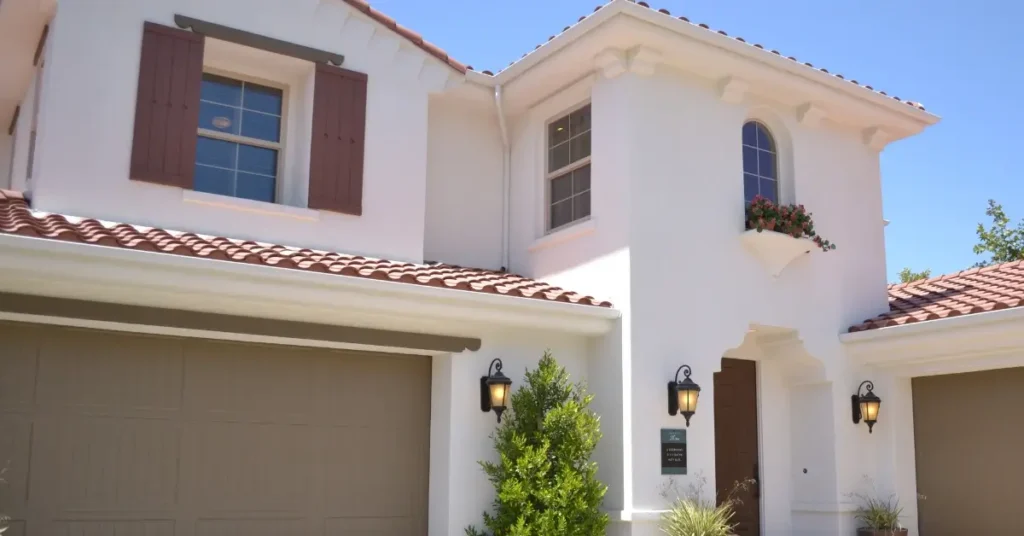
One of the most impressive examples I have seen is a concrete block home in Florida. The home was built with insulated concrete blocks, which provide a high level of thermal insulation. This means that the home stays cool in the summer and warm in the winter, reducing the need for heating and cooling systems. The homeowner reported a significant reduction in their energy bills after moving into the home.
Another example I have seen is a concrete block home in Arizona. The home was built with a combination of insulated concrete blocks and spray foam insulation. The insulation, combined with the thermal mass of the concrete blocks, helped to keep the home at a consistent temperature throughout the year. The homeowner reported that their energy bills were much lower than their previous home, which was not built with concrete blocks.
In addition to being energy efficient, concrete block homes are also durable and low-maintenance. They are able to withstand extreme weather conditions, such as hurricanes and tornadoes, and require little upkeep. This makes them a great long-term investment for homeowners.
Overall, I have found that concrete block homes are a great option for those looking to reduce their energy bills and live in a durable, low-maintenance home. With the right insulation and construction techniques, concrete block homes can be incredibly energy efficient and provide a comfortable living environment year-round.
FAQ
Is concrete good for energy efficiency?
Concrete is good for energy efficiency due to its high thermal mass, which helps to regulate indoor temperatures and reduce the need for heating and cooling. It also has a long lifespan and can be recycled, making it a sustainable and eco-friendly choice for construction.
What happens to concrete when heated?
When concrete is heated, the moisture inside it evaporates, causing it to expand and crack. The heat also causes the cement inside the concrete to dehydrate, losing water as vapor, which can weaken its structural integrity. Extreme heat can cause concrete to explode or spall.
What is the life expectancy of a concrete block house?
Concrete block houses can last for the life of the home, which is typically 100 years or more. However, factors such as weather, soil conditions, and maintenance can affect their lifespan. Proper installation and regular upkeep can help to ensure the longevity of a concrete block house.
If you liked this blog article about the topic: Are Concrete Block Homes Energy Efficient?, don’t forget to leave us a comment down below to tell us about your experience.
Feel free to also check out our other Articles from the category “Energy Efficiency“
